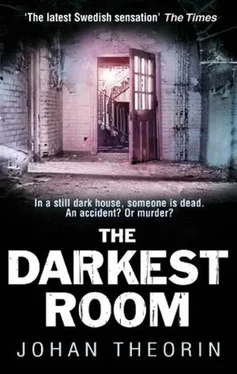“Hans, could you spare a moment?”
“Absolutely, Tilda.” Majner smiled at his colleagues and turned to her. “What is it?”
“I’d really like to talk about your message.”
“What message?”
“The message about the death at Eel Point.” Tilda moved to one side and Majner followed her. “You recognize this, I presume?”
She held up the piece of paper she had placed in the folder the day after she had received it from Majner. This was her proof.
Three names were written in ink on the note. The first was Livia Westin . The second was Katrine Westin . The third was Gabriel Westin .
Next to Livia’s name was a cross: †
“So?” said Majner, nodding. “Those were the names I got from the emergency call center.”
“Exactly,” said Tilda. “And you were supposed to mark the name of the person who drowned. That’s what I asked you to do.”
Majner was no longer smiling.
“And?”
“You put the cross in front of Livia Westin’s name.”
“Yes?”
“But that was wrong. It was the mother, Katrine Westin, who had drowned.”
Majner speared a few prawns with his fork and stuffed them in his mouth. He seemed completely uninterested in the conversation.
“Okay,” he said, munching on his prawns. “A mistake. Even the police make a mistake sometimes.”
“Yes, but it was your mistake,” said Tilda. “Not mine.”
Majner looked up at her.
“So you don’t trust me?” he said.
“Well, yes, but…”
“Good,” said Majner. “And just remember…”
“Are you two getting to know each other?” a voice interrupted them.
Inspector Holmblad had come to join them. Tilda nodded.
“We’re trying,” she said.
“Good. Don’t forget we’re going out after this, Tilda.”
Holmblad nodded and smiled and moved on, over to the reporter and photographer from the local paper.
Majner patted Tilda on the shoulder.
“It’s important to be able to rely on a colleague, Davidsson,” he said. “Don’t you agree?”
She nodded.
“Good,” said Majner. “Right or wrong… a police officer must be sure that he or she will always have backup. If anything happens.”
Then he turned his back on her and returned to his colleagues.
Tilda stood there, still wishing she was somewhere else.
“Right, Davidsson,” said Göte Holmblad half an hour later, when three quarters of the sandwiches had been eaten and the rest put away in the refrigerator. “We’d better get to our little meeting. We’ll take my car.”
At this point Tilda and the inspector were alone in the newly opened police station. Hans Majner had been one of the first to leave.
By this stage Tilda had decided she wasn’t even going to try to like him.
She put on her uniform cap, locked the station door, and went out to the car with Holmblad.
“We’re under no obligation to make a visit like this,” Holmblad explained when they were sitting in the car. “But Westin has called Kalmar a couple of times wanting to speak to me or someone else in authority, so I thought it would be a good idea to have a conversation with him face-to-face.” He started the car, pulled away from the sidewalk, and went on: “The important thing is to avoid official complaints and investigations. A visit like this isn’t an official gesture, but it usually clears up most misunderstandings.”
“I contacted Westin a few days after his wife’s death,” said Tilda, “but he wasn’t interested in talking at the time.”
“I can try to reason with him on this occasion,” said Holmblad. “That might work better. I mean, it isn’t a question of apologizing, but rather-”
“I have nothing to apologize for,” said Tilda. “I wasn’t the one who supplied the wrong information.”
“No?”
“It was a colleague who gave me a note with a mark next to the wrong name. I just read it out.”
“Oh? But as you know, it’s best not to inform relatives of a death over the telephone. I think we all have to accept responsibility for the fact that routine procedure wasn’t followed on this occasion.”
“That’s what my colleague said,” said Tilda.
They left Marnäs and drove along the coast road, south toward Eel Point. The road was completely deserted this afternoon.
“I’ve been thinking about buying myself a house on the island for a long time,” said Holmblad, glancing across at the meadows along the shoreline. “Here on the eastern side.”
“Oh yes?”
“It really is beautiful here.”
“Yes,” said Tilda. “This is where my family comes from, the villages around Marnäs. My father’s side of the family.”
“I see. Was that why you came back?”
“One of the reasons,” said Tilda. “The job was attractive too.”
“The job, yes,” said Holmblad. “Today it begins in earnest.”
A few minutes later they reached the yellow sign for Eel Point, and Holmblad turned off onto the winding gravel track.
They could see the lighthouses now, and the red buildings. This time Tilda was able to see the lighthouse keepers’ estate in daylight, even if gray cloud cover was hiding the sun.
Holmblad pulled up in front of the house and turned off the engine.
“Remember,” he said, “you don’t have to say anything if you don’t want to.”
Tilda nodded. Bottom of the heap-so keep quiet. Just like when she was little, at the dining table with her two older brothers.
In daylight the house at Eel Point seemed more appealing, thought Tilda, but it was still much too big for her to like the idea of living there.
Holmblad knocked on the glass pane in the kitchen door; the door opened after a minute or so.
“Good afternoon,” said Holmblad. “Here we are.”
Joakim Westin’s face had become even more gray, Tilda thought. She knew he was thirty-four, but he looked like a fifty-year-old. His eyes were dark and tired. He simply nodded at Holmblad and didn’t even acknowledge Tilda. Not even with a glance.
“Come in.”
Westin disappeared into the darkness, and they followed him. Everything was neat and clean, no dust bunnies, but when Tilda looked around it was as if a gray film had settled over everything.
“Coffee?” asked Westin.
“Thank you, that would be good,” said Holmblad.
Westin went over to the coffeemaker.
“Are you on your own here now… you and the children?” asked Holmblad. “No relatives?”
“My mother has been staying with us,” said Westin, “but she’s gone back home to Stockholm.”
There was a silence. Holmblad adjusted his uniform.
“We’d very much like to start by expressing our regrets… and saying that this sort of thing simply shouldn’t happen,” he said. “The procedures with regard to informing relatives about a death fell down somewhat in this case.”
“You’ve got that right,” said Westin.
“Yes, we do regret what happened. But…”
“I thought it was my daughter,” said Westin.
“I’m sorry?”
“I thought my daughter had drowned. I thought that for several hours, all the way from Stockholm to Öland. And the only consolation… it wasn’t much of a consolation, but the only consolation was that my wife, Katrine, would be
there when I arrived, and she would be feeling even worse than me. Then at least I would be able to try and console her, for the rest of our lives.” Westin paused, then went on very quietly: “We would have each other, at least.”
He fell silent, gazing out of the window.
“As I said, our sincere regrets,” said Holmblad. “But it’s happened now… and we have to make sure that it doesn’t happen again. To a relative of someone else, I mean.”
Читать дальше










